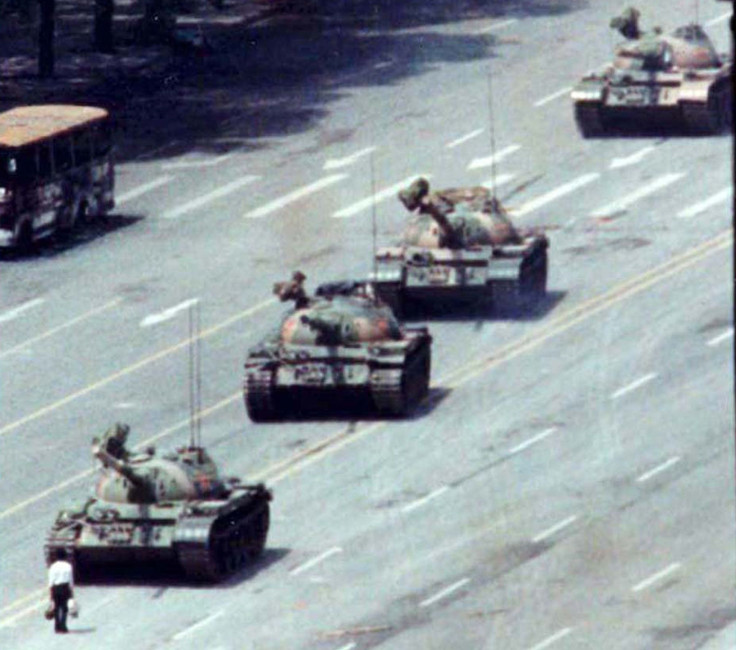25 Years Later, The Tiananmen Student Protesters Continue Their Activism

What began as a student-led memorial commemorating the death of a Communist Party leader and champion of reform in the spring of 1989 escalated to be one of the grimmest moments in modern Chinese history -- the Tiananmen Square massacre of June 4.
The sudden death of General Secretary Hu Yaobang, who died after suffering a heart attack in April 1989, marked the beginning of student-led gatherings. Despite a vast age difference, he was championed by students as a Communist Party leader and reformer who was in favor of political liberalization, and encouraged dialogue with the population. For many of China’s students, he was a beacon of hope for a reformed China. After his death, students believed they had lost their only voice among an increasingly conservative regime. As a result, many of them rallied in the streets to support Hu's political legacy -- and to this day, many of them still do.
Among those principles were freedom of the press and speech, the end of government corruption and increased democratic rights. Through the spring, rallies gained more exposure and momentum, gaining support from factory workers, intellectuals and even celebrities.
Twenty-five years later, many of the surviving student leaders at the forefront of the protests are no longer in China, but they have not relented in their fight.
“The 6-4 incident, we will never forget, until the day that we fall,” Wang Dan, a key student leader and organizer of the rallies, said in a video released Wednesday. Wang Dan, a native of northeastern province of Jilin, was a history student at Peking University and at the epicenter of the protests, earning him the distinction of being No. 1 on the government’s most wanted list during the crackdowns that followed. After being arrested twice, in 1989 and in 1996, for subversion, he was released on medical parole and exiled to the United States. Today, Wang resides in Taiwan, still steadfast in advocating the ideals that changed his life: “I hope democratization and the spirit has not fallen.”
“We are here to ensure you that we are willing to continue with everyone to vindicate the fight for democracy in China, and work. I think that democracy is our real China Dream.”
Like Wang, many other members of the student movement were exiled from mainland China or fled in fear for their lives. Wu’er Kaixi, an ethnic Uighur from China's western province of Xinjiang, was No. 2 on the government’s most wanted list. According to the South China Morning Post, citing exile sources, he fled to Hong Kong, eventually making it to the United States before settling in Taiwan. Wu’er has attempted to return to the mainland multiple times to see his family, but his appeals continue to be rejected.
Others, like Chai Ling, have found a way to use their Tiananmen background to educate and advocate in the U.S. After fleeing to the U.S., Chai earned degrees from Princeton and Harvard, briefly pursued a career as a consultant, and even founded an Internet company before returning to her political roots. In 2009, Chai founded a nonprofit organization in Boston called All Girls Allowed, which advocates for the rights of women and children in China.
Many of the biggest figures of the protests have resigned themselves to a life of exile. For those who remain in China, honoring Tiananmen or the issues that surrounded the protests continues to be impossible.
Guo Jian is an artist and a naturalized citizen of Australia who currently lives in Beijing. Despite Guo’s status as a foreign national, local authorities have no qualms in treating him harshly. His art is influenced by his life growing up during the Great Leap Forward-era in 1960s China and as a student during the 1989 protests. According to the Chinese Human Rights Defenders, a human rights activist group in China, Guo was recently taken from his studio to a suburban detention center, under ambiguous charges, and will be detained for 15 days. The Australian Embassy in Beijing contacted local authorities to provide support, noting that his detention was likely linked to an interview he gave to the Financial Times about a private art installation commemorating the anniversary of the June 4 massacre.
While Guo’s detention seems to be temporary, others are not so lucky. Liu Xiaobo is best known as the 2010 Nobel Peace Prize recipient “for his long and nonviolent struggle for fundamental human rights in China.” However, Chinese authorities see Liu’s activism as “undermining state authorities,” a charge brought against him in May 2010 for writing an influential text called “Charter 08” documenting legal, political and human rights injustices. Despite an international outcry, Liu remains in prison.
© Copyright IBTimes 2025. All rights reserved.






















